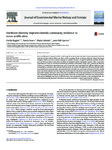Herbivore diversity improves benthic community resilience to ocean acidification
| dc.contributor.author | Baggini, C | |
| dc.contributor.author | Issaris, Y | |
| dc.contributor.author | Salomidi, M | |
| dc.contributor.author | Hall-Spencer, Jason | |
| dc.date.accessioned | 2015-12-09T15:55:40Z | |
| dc.date.available | 2015-12-09T15:55:40Z | |
| dc.date.issued | 2015-08 | |
| dc.identifier.issn | 0022-0981 | |
| dc.identifier.issn | 1879-1697 | |
| dc.identifier.uri | http://hdl.handle.net/10026.1/3898 | |
| dc.description.abstract |
Ocean acidification is expected to alter a wide range of marine systems, but there is great uncertainty about the outcome because indirect effects are often crucial in ecology. Work at volcanic seeps has shown that major ecological shifts occur due to chronic exposure to acidified seawater. Changes in herbivore densities are often seen and this may interact with direct CO<inf>2</inf> effects to determine benthic community structure. Here, an exclusion experiment was used to test effects of herbivory in benthic communities along a pCO<inf>2</inf> gradient off Methana (Greece). A manipulative experiment was used to examine how large herbivores affected sublittoral algal communities as seawater carbon dioxide levels increased. Sea urchins and herbivorous fish dramatically reduced macroalgal biomass at background carbon dioxide levels; this effect was not hampered by increased pCO<inf>2</inf> despite lower sea urchin densities near the seeps, since herbivorous fish abundances increased concurrently. We found that carbon dioxide levels up to about 2000μatm are unlikely to reduce the role of herbivory in structuring benthic communities if tolerant species are able to replace those that are vulnerable. A shift from sea urchins to fish as main grazers highlights that ocean acidification may cause unexpected responses at the community level, and that maintaining high functional redundancy in marine ecosystems is key to improving their resilience. | |
| dc.format.extent | 98-104 | |
| dc.language | en | |
| dc.language.iso | en | |
| dc.publisher | Elsevier BV | |
| dc.subject | Functional redundancy | |
| dc.subject | Ocean acidification | |
| dc.subject | Species interactions | |
| dc.title | Herbivore diversity improves benthic community resilience to ocean acidification | |
| dc.type | journal-article | |
| dc.type | Journal Article | |
| plymouth.author-url | https://www.webofscience.com/api/gateway?GWVersion=2&SrcApp=PARTNER_APP&SrcAuth=LinksAMR&KeyUT=WOS:000356545200013&DestLinkType=FullRecord&DestApp=ALL_WOS&UsrCustomerID=11bb513d99f797142bcfeffcc58ea008 | |
| plymouth.volume | 469 | |
| plymouth.publication-status | Published | |
| plymouth.journal | Journal of Experimental Marine Biology and Ecology | |
| dc.identifier.doi | 10.1016/j.jembe.2015.04.019 | |
| plymouth.organisational-group | /Plymouth | |
| plymouth.organisational-group | /Plymouth/Faculty of Science and Engineering | |
| plymouth.organisational-group | /Plymouth/Faculty of Science and Engineering/School of Biological and Marine Sciences | |
| plymouth.organisational-group | /Plymouth/PRIMaRE Publications | |
| plymouth.organisational-group | /Plymouth/REF 2021 Researchers by UoA | |
| plymouth.organisational-group | /Plymouth/REF 2021 Researchers by UoA/UoA07 Earth Systems and Environmental Sciences | |
| plymouth.organisational-group | /Plymouth/Research Groups | |
| plymouth.organisational-group | /Plymouth/Research Groups/Marine Institute | |
| plymouth.organisational-group | /Plymouth/Users by role | |
| plymouth.organisational-group | /Plymouth/Users by role/Academics | |
| dc.identifier.eissn | 1879-1697 | |
| dc.rights.embargoperiod | Not known | |
| rioxxterms.versionofrecord | 10.1016/j.jembe.2015.04.019 | |
| rioxxterms.licenseref.uri | http://www.rioxx.net/licenses/all-rights-reserved | |
| rioxxterms.type | Journal Article/Review |


